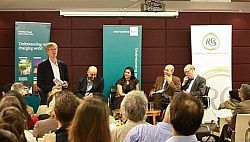School of Global Studies debate on religion and conflict brings a ‘new idea’ to an old problem
The first Peace Talks event involving the School of Global Studies in partnership with peacebuilding NGO International Alert and the Royal Commonwealth Society was held last week (Monday 22 April) at the Commonwealth Club in London.
 Over 150 people turned up at the public debate entitled ‘War, Peace and Faith: the ambiguous role of religion in 21st century conflict’.
Over 150 people turned up at the public debate entitled ‘War, Peace and Faith: the ambiguous role of religion in 21st century conflict’.
The debate was led by a panel of expert speakers featuring:
- Dr Fabio Petito, Senior Lecturer in International Relations, who works on religions, cultures and civilisations
- Rama Mani, Senior Research Associate at the University of Oxford's Centre for International Studies
- Aaqil Ahmed, Head of Religion and Ethics at the BBC
- Andrew Brown, Editor of Comment is Free- Belief at The Guardian
- Dan Smith, Secretary General of International Alert, who chaired the discussion.
“It was an interesting discussion,” commented Dr Petito. “Rather than simply stating the usual arguments I felt that we actually found a new angle on these issues.” This sentiment was echoed in The Guardian by Andrew Brown, who in his blog wrote, "for once a new idea emerged from our exchanges."
Dr Petito was invited to begin the discussion setting the context by explaining that there has been a resurgence of religion in world politics since the end of the Cold War, which is a development that secular society has been both ill-equipped and largely unwilling to deal with.
A secular hostility to religion was noted, with the result that it is often excluded from peace attempts. All panellists agreed that the usual assumption that ‘where there’s religion, there’s violence’ was wrong – it was actually the other way around. The importance of religious literacy emerged, with panellists noting the connection between weak religious knowledge and extremism, the latter often resulting in violence. The importance of knowledge, reflexivity and depth in religion was deemed to be critical – weak religion was open to exploitation by political entrepreneurs aiming for conflict. It was agreed that the media had an important role to play in this, with Brown and Ahmed offering ‘insider’ insights on how this might work.
Finally, the role of religion in peacemaking was discussed, with examples ranging from Desmond Tutu to democratisation in post-war and Soviet Europe. Its peacemaking potential coming from the characteristics that made it different from, and feared by, secularism.
The ambiguity and paradox of religion, highlighted through its involvement in conflict, emerged as its greatest strength. The discussion concluded that this offered unique resources for conflict-resolution and the prevention of violence.
‘War, Peace and Faith: the ambiguous role of religion in 21st century conflict’ marked the first in what it is hoped could become an established collaboration between the School of Global Studies and International Alert. The School and the peacebuilding organisation have already started planning the next Peace Talks event to be held in June on issues of conflict in Africa.
